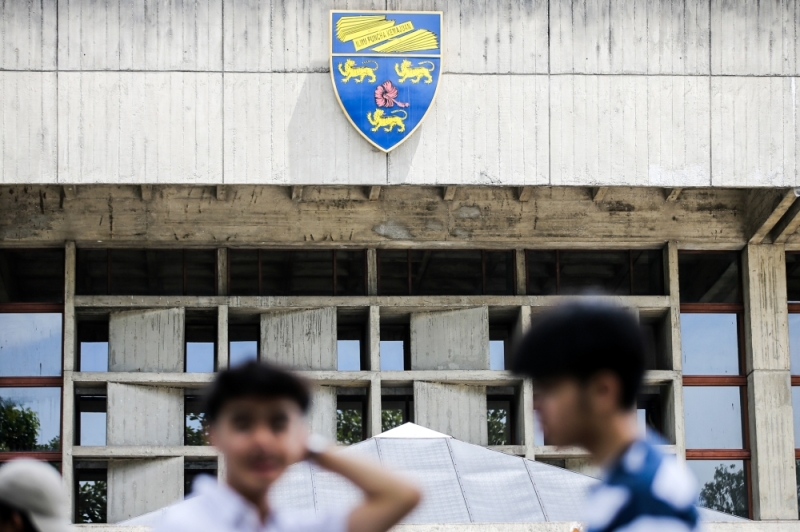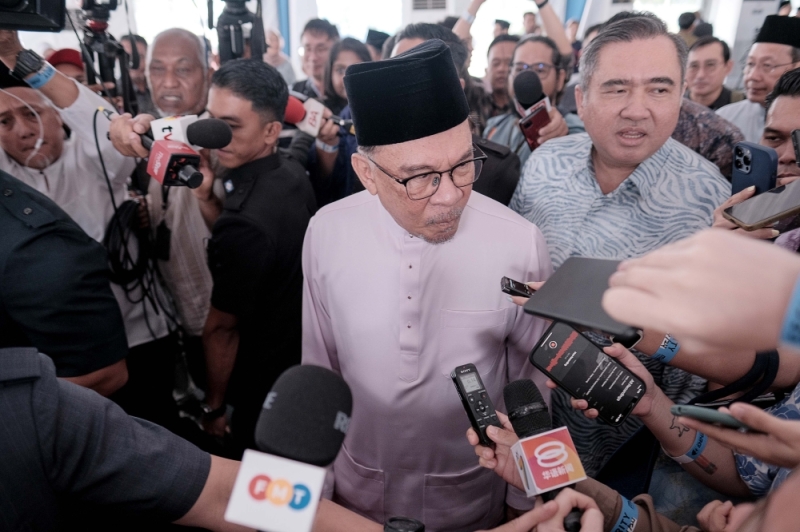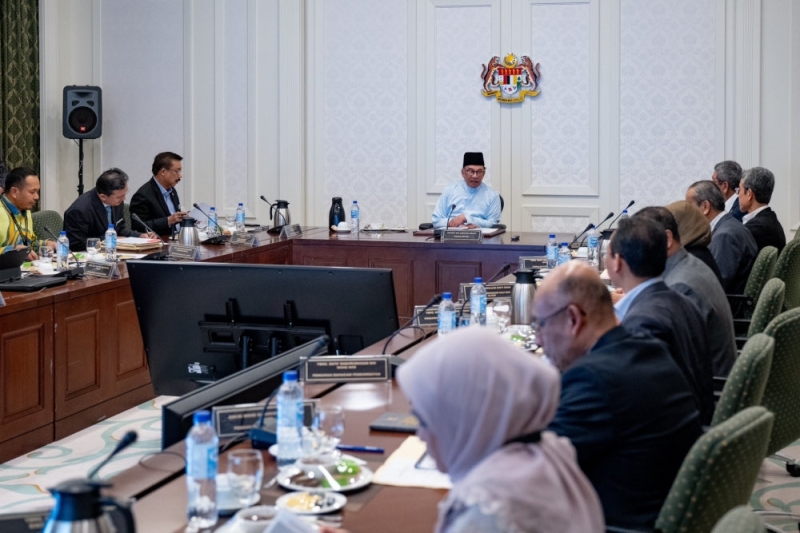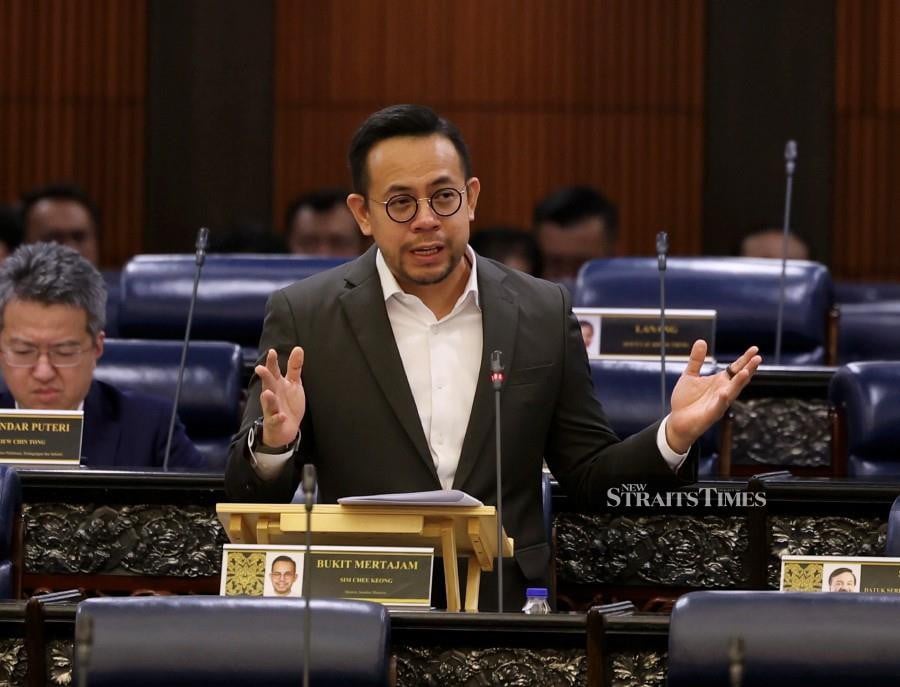ACADEMIC FREEDOM - Can Universities invite foreign academics to speak? Or no academic freedom anymore - requirement of prior government approval for speakers in universities and/or schools? BEWARE as this government is placing more and more restrictions on what we can talk about - even
The restriction imposed on visiting professors and speakers who are pro-Zionist must be seen from the aspects of security and the image of the country which may be affected and tarnished because of their statements. Higher Education Minister Datuk Seri Dr Zambry Abd Kadir said therefore, the allegation that the restriction would affect academic freedom should not be raised.
Is the Government moving towards censorship of speakers - they cannot say this and that? They cannot criticize the government? or statements made by present or former Prime Ministers?
"I hope that those who commented on this need to distinguish between the context of academic freedom and freedom that touches on the country's image and reputation," he told reporters after attending the Higher Education Ministry's (MOHE) Aifilfitri celebration here today.Zambry said this in response to the statement made by a local professor that Universiti Malaya (UM) should not have apologised for inviting the American professor Bruce Gilley who made controversial and disrespectful statements during his lecture at the university recently.We do not know the full text of Bruce Gilley's speech, and all we have heard about are 'extracts' and allegedly that he is pro-Zionist.
Bruce Gilley is just an academic, not representing any country, and as a speaker he has every right to voice out his view on any subject matter. Now, in such forums, usually other panelists will have the ability to respond or challenge the views of a particular speaker. Likewise, the floor or the attendees also will have the opportunity to respond >> sadly, media did not cover these responses - Did everyone there not question or respond when Gilley said something they did not agree with or had a different view?
Prime Minister Anwar Ibrahim, in my opinion, goes overboard when he calls that Professor a 'mediocre scholar'. He should have just highlighted and criticized the views of Gilley that he did not agree to. When UM invites, they would never invite 'mediocre scholar's... Would an academician that expresses anti-Zionist views be a 'eminent' scholar? Would an academic who praises the PM be a mediocre or good scholar? Whether one is a good or bad scholar really does not depend on his views on certain subject matter, does it now?
A mediocre scholar should not be brought in as a visiting professor, says Prime Minister Datuk Seri Anwar Ibrahim. His criticism against US academician Bruce Gilley came in the wake of the latter's controversial statements against Malaysia for supporting Palestine. "Mediocre scholar should not be invited as a visiting professor in the first place.
LISTEN to every viewpoint and/or opinions. Consider the various arguments and points, and DECIDE what is your position or conclusion. Government has no business deciding what or whose views the people should listen to - this is a VIOLATION of the freedom of expression and opinion, and a LACK OF TRUST in the wisdom of Malaysians and/or individuals. In Malaysia, for a long time schools and/or universities were not allowed to invite Opposition politicians, human rights defenders and activist to speak...Is PM Anwar continuing this 'policy'? Is this government ONLY allowing pro-government people to speak to students?
We don't need no educationWe don't need no thought controlNo dark sarcasm in the classroomTeacher, leave them kids aloneHey, teacher, leave them kids aloneAll in all, it's just another brick in the wallAll in all, you're just another brick in the wall - lyrics from Pink Floyd's Another Brick in the Wall
Malaysians, including Malaysian students, need to know other views and opinions, and learn also how to counter-them effectively. Thus BLOCKING other views is not real Education, and it is bad education.
What will Malaysian students studying overseas do when they hear anti-Palestine or pro-Zionist arguments? Will they be able to logically and reasonably argue against of debate the points made that are pro-Zionist? Or will Malaysian students simply react in 'silence' or anger without the ability to counter these views that they do not agree to?
EDUCATION is not 'brainwashing' - it is not simply pumping into the minds of students the views and positions of the current government. Such kind of education is also bad for REFORMASI or Transformation - as students out of such a system will be lacking in alternative ideas and views...?
If we prevent Malaysians or students from listening to people with different views, or views that is not in line with the current government's views, does it help people become educated and/or mature. Just feeding students and others with government views or government approved views ONLY is wrong. It maybe called BRAINWASHING.
But sadly, this is what happens in Malaysian Parliament - Government MPs generally do not even listen and consider the views and points made by the Opposition - they 'blindly' support the government position and proposed laws. Likewise, many Opposition MPs also adopt a similar attitude - end result not a Parliamentary 'debate' where one should at the very least be open to differing views, all of which must be taken into consideration when one makes a final decision - to support, oppose or abstain.
In Malaysia, the government also tries to control the freedom of opinion, expression - they simply do not allow people to consider different views, think about it and make an informed decision on their own > Just LISTEN and follow the views of the government.
The situation is DIRE in Parliament, so much so that decisions are made based on ambiguous 'VOICE VOTES' which presumes that Government Party MPs approve and Opposition MPs oppose.
So, the people do not even know how many MPs voted in Support, how many opposed and how many abstained. We will never even know how our MP or some other MP voted > If we knew, then we could lobby individual MPs to take particular position or change their position. REFORM Needed - all votes must be counted. Better still, people must know how their MP voted - TRANSPARENCY. If not, MPs can LIE and say things that they voted differently from what was perceived or about how they really voted.
At a session at the Bar Council some years back, when Anwar Ibrahim was speaking - when asked why Anwar did not oppose the use of the ISA during Operation Lallang and other mass arrests. Anwar responded that he oppossed the use of ISA, and this he clearly communicated to the Prime Minister. Who would believe him? After all, there was no Parliamentary Record or media report stating that this was the case. One BN MP that stands out is Nazri Aziz, who despite the government position on death penalty came out in the media and stated that he personally opposed the death penalty.
For every issue, one must make a decision after considering pro and anti views > the right to decide is with the individual, not the government. The government does not decide on our own view of things/issues. IT is foolish to say that we must agree with everything PM Anwar says..or even the Ruler says.
In UNIVERSITY, after the Universities and University Colleges Act 1971[UUCA] has been used to take away the freedom/rights of students and even academics. The UUCA was one of the draconian legislation that PH said it will repeal - but what happened is just some minor amendments - which is not enough.
Can a Malaysian University student association or even school student groups invite members of the Opposition to speak to them? [Well, for a long time, University students had to first get approval of the University authorities with regard to programs, speakers and even publications - there was NO FREEDOM.
Can Universities and/or schools in Malaysia invite Human Rights Defenders and activist - who many a time may highlight the failings and lackings of government as they call for REFORMS?
YES, some minor amendments to the UUCA - but nothing much have changed. Supporting government activities OK - but others maybe not OK.
University Students FREEDOM is still an issue even after about 17 months of PM Anwar Ibrahim's Pakatan Harapan led coalition government - What happened to the PH's promise to abolish the Universities and University Colleges Act?
Pakatan Harapan's GE15 pledge to abolish the University and Universities Colleges Act 1971 (UUCA) will not be fulfilled.According to Higher Education Minister Mohamed Khaled Nordin (BN-Kota Tinggi), the law was still relevant,...Harapan had promised to abolish the UUCA as part of its GE15 election pledges. Its goal was to grant more autonomy to universities and institutions of higher learning."The UUCA will be abolished and students, lecturers, and alumni will be recognised as the true stakeholders," read the Kita Boleh! Harapan GE15 Action Plan document...' - Malaysiakini, 24/2/2024
When a person hears a view or opinion, it is dangerous to simply accept it even if it is the view of the Prime Minister or the government. People MUST CONSIDER any views, and then decide whether I agree or I do not. In fact a good educator stimulates the consideration of different views on any subject matter - we need THINKING students - not students that simply follow the views of the government of the day.
In my view, UM did no wrong in inviting Professor Bruce Gilley? Of course, those who invited cannot be blamed for anything the said speaker says during his speech or other interventions. Hence, it was wrong for the University to even apologize.
If someone says something that we do not agree with - then, criticize him with words and other protest actions. We may be not opposed to everything he said, so critic what we do not agree with.
I personally am against Zionist Israel, not all Jews or Israelis as many Jews and Israeli are also against what the Israeli government are doing, and are pro-Palestine.
On the Palestine Issue, it is shocking the US now(24/4/2024), despite what Israel is doing to the Palestinians just approved US26.4 Billion Aid for Israel
The Senate passed a foreign aid package Tuesday that includes money for Ukraine, Israel and the Indo-Pacific region. ...The package would provide $26.4 billion to aid Israel, specifying that the funds are to support “its effort to defend itself against Iran and its proxies, and to reimburse US military operations in response to recent attacks,” - CNN, 24/4/2024What would Malaysia's response be? It is easy to attack one Professor and a Malaysian University - but what will PM Anwar Ibrahim, Malaysian Government and Malaysians do with US that is funding Israel, who is an ongoing violator of human rights? Would Anwar speak out or even send a PROTEST NOTE to the US Embassy?
Criticisms against Gilley's views is OK.
See also:-
Students - human rights defenders for the poor and marginalised in Malaysia?
Palestine - Anwar reveals US 'demarche' - so any other pressure from other States? Did Malaysia send protest notes to US, and other countries?
UM apologises for hosting pro-Israel professor, lambasts him for claiming Malaysia unsafe for travellers

KUALA LUMPUR, April 25 — The University of Malaya (UM) has today expressed regret for hosting a controversial American academic who accused Malaysian leaders of advocating a “second Holocaust” for Jews in a lecture.
In a statement, the university then lambasted Bruce Gilley for claiming that Malaysia is not safe for travellers after Putrajaya ordered that his events be cancelled due to his remarks.
“This is an irresponsible and extreme statement that angers every Malaysian," it said.
UM also said it has acknowledged the directive from the Ministry of Higher Education and promptly responded by cancelling all planned programs and activities featuring Gilley.
“UM expresses regret over the controversial statements that disregard societal sentiments as circulated on social media platforms,” it said.
Gilley, a professor of political science at Portland State University, was invited by the Department of International and Strategic Studies for three events, starting with a seminar on international relations on Monday.
On Tuesday, Gilley delivered a keynote address titled “Will Malaysia Become an Active Middle Power”. Yesterday, in an X post about the speech, he said “a country whose political leaders advocate a second Holocaust against the Jewish people will never be a serious player in world affairs, and will certainly never be a friend or partner of the US”.
Gilley pointed to the remarks of former prime minister Tun Dr Mahathir Mohamad and Agriculture Minister Datuk Seri Mohamad Sabu.
He has since deleted the post, claiming it was for the safety and well-being of UM staff who invited him.
Gilley is known to be a supporter of Israel, displaying the state's flag on his X account.
He is also a controversial figure among the Western academia for praising Western colonialism and saying it should be “reclaimed”, considered “legitimate”, and even “resurrected”.
In 2017, his article The Case for Colonialism was published in the Third World Quarterly
journal and provoked massive controversy resulting in two petitions
signed by thousands of academics calling for the editor responsible to
be sacked, while 15 of the journal's 34-member editorial board resigned
in protest. - Malay Mail, 25/4/2024
'Mediocre' scholars shouldn't be visiting professors here, PM Anwar says after UM invited pro-Israel, pro-colonialism academic

SEPANG April 26 — Prime Minister Datuk Seri Anwar Ibrahim has today urged local education institutions to be more discerning in the kind of academics they invite.
He called American academic Bruce Gilley a “mediocre” professor, after the advocate for Western colonialism called Malaysian leaders of calling for “second Holocaust” for Jews.
“Mediocre scholars shouldn't be brought to Malaysia as visiting a professor.
“The rest the [higher education] minister has already clarified," Anwar told reporters when met at the Malaysia Aviation Group (MAG) official launch of its new MAB Academy campus and the groundbreaking of its Flight Simulator Building at the South Support Zone here.
Gilley, a professor of political science at Portland State University, was invited by the Department of International and Strategic Studies for three events, starting with a seminar on international relations on Monday.
On Tuesday, Gilley delivered a keynote address titled “Will Malaysia Become an Active Middle Power”. Yesterday, in an X post about the speech, he said “A country whose political leaders advocate a second Holocaust against the Jewish people will never be a serious player in world affairs, and will certainly never be a friend or partner of the US”.
Gilley pointed to the remarks of former prime minister Tun Dr Mahathir Mohamad and Agriculture Minister Datuk Seri Mohamad Sabu.
He has since deleted the post, claiming it was for the safety and well-being of UM staff who invited him.
Gilley is known to be a supporter of Israel, displaying the state's flag on his X account.
He is also a controversial figure among the Western academia for praising Western colonialism and saying it should be “reclaimed”, considered “legitimate”, and even “resurrected”.
In 2017, his article The Case for Colonialism was published in the Third World Quarterly journal and provoked massive controversy resulting in two petitions signed by thousands of academics calling for the editor responsible to be sacked, while 15 of the journal's 34-member editorial board resigned in protest.
UM has since apologised for hosting Gilley and criticised him for his remarks on the country.
Earlier, Minister of Higher Education Datuk Seri Zambry Abd Kadir today lambasted Gilley after the latter claimed that Malaysia is not safe for travellers after Putrajaya ordered that his events be cancelled due to his sensitive remarks.
Zambry deemed the remarks
of the academic — who is an advocate for Western colonialism — as
dangerous and could tarnish Malaysia’s image, considering the country
did not even act against him for his remarks.- Malay Mail, 26/4/2024













